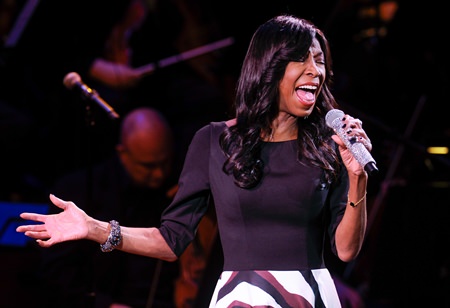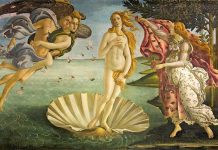Los Angeles (AP) – Natalie Cole, the daughter of jazz legend Nat King Cole, who carved out her own success with R&B hits like “Our Love” and “This Will Be” before triumphantly intertwining their legacies to make his “Unforgettable” their signature hit through technological wizardry, died last week. She was 65.
While Cole was a Grammy winner in her own right, she had her greatest success in 1991 when she re-recorded her father’s classic hits — with him on the track — for the album “Unforgettable … With Love.” It became a multiplatinum smash and garnered her multiple Grammy Awards, including album of the year.
 The late Natalie Cole is shown performing in this March 2, 2015 file photo. (Photo by Evan Agostini/Invision/AP)
The late Natalie Cole is shown performing in this March 2, 2015 file photo. (Photo by Evan Agostini/Invision/AP)
Cole died Thursday, Dec. 31 at Cedars-Sinai Medical Center in Los Angeles due to complications from ongoing health issues, her family said in a statement.
“Natalie fought a fierce, courageous battle, dying how she lived … with dignity, strength and honor. Our beloved Mother and sister will be greatly missed and remain UNFORGETTABLE in our hearts forever,” read the statement from her son Robert Yancy and sisters Timolin and Casey Cole.
“I had to hold back the tears. I know how hard she fought,” said Aretha Franklin in a statement. “She fought for so long. She was one of the greatest singers of our time.”
Other celebrities honored Cole on social media. In a tweet, actress Marlee Matlin called Cole a lovely songbird and a great actress, writing “she is now singing in heaven.” Patti LaBelle tweeted, “She will be truly missed but her light will shine forever!”
Natalie Cole had battled drug problems and hepatitis that forced her to undergo a kidney transplant in May 2009. Cole’s older sister, Carol “Cookie” Cole, died the day she received the transplant. Their brother, Nat Kelly Cole, died in 1995.
Natalie Cole was inspired by her dad at an early age and auditioned to sing with him when she was just 11 years old. She was 15 when he died of lung cancer, in 1965.
She began as an R&B singer but later gravitated toward the smooth pop and jazz standards that her father loved.
Cole’s 1991 album, “Unforgettable … With Love,” paid tribute to her father with reworked versions of some of his best-known songs, including “That Sunday That Summer,” ‘’Too Young” and “Mona Lisa.”
Her voice was spliced with her dad’s in the title cut, offering a delicate duet a quarter-century after his death.
The album sold some 14 million copies and won six Grammys, including album of the year as well record and song of the year for the title track duet.
While making the album, Cole told The Associated Press in 1991, she had to “throw out every R&B lick that I had ever learned and every pop trick I had ever learned. With him, the music was in the background and the voice was in the front.”
“I didn’t shed really any real tears until the album was over,” Cole said. “Then I cried a whole lot. When we started the project it was a way of reconnecting with my dad. Then when we did the last song, I had to say goodbye again.”
She was also nominated for an Emmy award in 1992 for a televised performance of her father’s songs.
“That was really my thank you,” she told People magazine in 2006. “I owed that to him.”
Another father-daughter duet, “When I Fall in Love,” won a 1996 Grammy for best pop collaboration with vocals, and a follow-up album, “Still Unforgettable,” won for best traditional pop vocal album of 2008.
Cole made her recording debut in 1975 with “Inseparable.” The music industry welcomed her with two Grammy awards in 1976 — one for best new artist and one for best female R&B vocal performance for her buoyant hit “This Will Be (An Everlasting Love).”
She also worked as an actress, with appearances on TV’s “Touched by an Angel” and “Grey’s Anatomy.”
But she was happiest touring and performing live.
“I still love recording and still love the stage,” she said on her website in 2008, “but like my dad, I have the most fun when I am in front of that glorious orchestra or that kick-butt big band.”
Cole was born in 1950 to Nat “King” Cole and his wife, Maria Ellington Cole, a onetime vocalist with Duke Ellington who was no relation to the great bandleader.
Her father was already a recording star, and he rose to greater heights in the 1950s and early ’60s. He toured worldwide, and in 1956 he became the first black entertainer to host a national TV variety show, though poor ratings and lack of sponsors killed it off the following year. He also appeared in a few movies and spoke out in favor of civil rights.
Natalie Cole grew up in Los Angeles’ posh Hancock Park neighborhood, where her parents had settled in 1948 despite animosity from some white residents about having the black singer as a neighbor. When told by residents who said they didn’t want “undesirable people” in the area, the singer said, “Neither do I, and if I see (any), I’ll be the first to complain.”
The family eventually included five children.
Natalie Cole started singing seriously in college, performing in small clubs.
But in her 2000 autobiography, “Angel on My Shoulder,” Cole discussed how she had battled heroin, crack cocaine and alcohol addiction for many years. She spent six months in rehab in 1983.
When she announced in 2008 that she had been diagnosed with hepatitis C, a liver disease spread through contact with infected blood, she blamed her past intravenous drug use.
She criticized the Recording Academy for giving five Grammys to drug user Amy Winehouse in 2008.
“I’m an ex-drug addict and I don’t take that kind of stuff lightly,” Cole explained at the 2009 Grammy Awards. Hepatitis C “stayed in my body for 25 years and it could still happen to this young woman or other addicts who are fooling around with drugs, especially needles.”
Cole received chemotherapy to treat the hepatitis and “within four months, I had kidney failure,” she told CNN’s Larry King in 2009. She needed dialysis three times a week until she received a donor kidney on May 18, 2009.
Cole toured through much of her illness, often receiving dialysis at hospitals around the globe.
“I think that I am a walking testimony to you can have scars,” she told People magazine. “You can go through turbulent times and still have victory in your life.”




